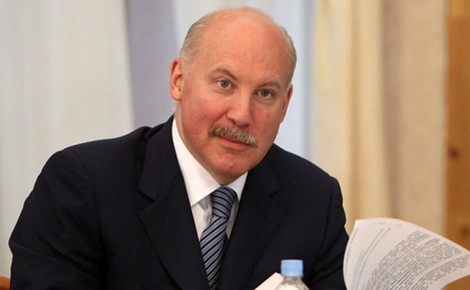
The shuffle of persons in the Russian Embassy does not indicate a change in the Kremlin`s interests regarding Belarus.

Photo: https://echo.msk.ru
On April 30, Vladimir Putin recalled Mikhail Babich from Belarus and appointed Dmitry Mezentzev as the new ambassador of the Russian Federation.Such a decision was preceded by long-lasting tensions between ambassador Babich and the official Minsk. At the press-conference on April 20, Aliaksander Lukashenka refrained from commenting on ambassador’s behaviour and noted that the Russian side «will deal with him on their own».
Commentary
- The appointment of Mikhail Babich the Russian ambassador to Belarus in August 2018 caused numerous speculations about what his mission might be. Babich, formerly the chair of the Chechen government, arrived to Belarus not only as an ambassador but also as a «special presidential representative» on trade and economic affairs. In this connection the ambassador actively visited Belarusian regions and joint enterprises with Russian investments, promised favourable conditions for Belarusian partners on the Russian market and increased competitiveness of the joint venture products at the third-country markets. Babich also met with representatives of international organizations in Minsk and discussed the priorities of the IMF, World Bank, and the United Nations towards Belarus. For instance, at the meeting with the UN Resident Coordinator Joanna Kazana-Wisniowiecki the ambassador discussed potential joint projects with the Russian Federation. Mikhail Babich’s meetings with the leaders of the oppositional «Tell the Truth» campaign and the United Civil Party also received extensive coverage in media. Although each separate trip and meeting could be explained as an attempt to get acquainted with the country and establish working contacts, official Minsk perceived the whole range of ambassador’s activities with suspicion, in the light of his conflict with the MFA of Belarus.
- After Mr. Babich, in his interview to RIA in March, had suggested that Lukashenka was «misled» by his advisers on Russia`s economic policy, a harsh verbal ping pong occurred between Babich and the Foreign Ministry of Belarus. Anatol Glaz, the press secretary for the Belarus`s Foreign Ministry, called Babich an «accountant» and scathingly added that the ambassador seemed not to understand the «difference between a federal district and an independent state». The Russian ambassador paid Glaz back by calling him an «ordinary clerk». It was evident that the relations were derailing from the diplomatic track and the replacement of the ambassador was the only remedy.
- The newly appointed ambassador Dmitry Mezentzev is already familiar with Belarus. During his service as the Secretary General of the Shanghai Cooperation Organization (SCO), Belarus was granted an observer status to which the official Minsk had aspired for ten years. President Aliaksandr Lukashenkapersonally expressed gratitude to Dmitry Mesentzev when the SCO made an exception for Belarus, a European country that did not belong geographically to the Asian region. Dmitry Mezentzev also chaired the SCO mission that monitored Belarusian presidential elections in 2015. Given previous positive experience of the Belarusian leadership with the new ambassador, the relationships promise to be less strained than with his predecessor.
- The replacement of ambassador Michail Babich is undoubtedly a friendly gesture of Moscow. However, in the big picture, the shuffle of persons in the Russian Embassy does not indicate a change in the Kremlin`s interests regarding Belarus. Although Moscow took into account Minsk’s frustration and replaced the ambassador, such a move does not mean that the Kremlin gave up its the geopolitical ambitions towards Belarus. The next important step in bilateral relations is the negotiation of the future of the Union State. Since its inception in 1999, the Union State treaty has existed predominantly on paper. However, following Russian Prime-Minister Dmitry Medvedev’s calls for closer integration, the dialogue on the Union State was renewed in December 2018. Moscow might be testing the Union State project as a legitimate tool of projecting influence on Minsk.
- The Kremlin’s long-term strategic interest is to assert Russia on a global stage alongside with the US and China and to establish regional hegemony in the «near abroad», including Belarus. From the Kremlin’s perspective, deep integration through the already existing treaty could be a more elegant solution rather than overt coercion fraught withthe risk of sanctions and condemnation by international community. Moscow will likely advocate for coordinated policies through the supranational bodies of the Union State, where it could get an upper-hand in the decision-making process. During past months the integration proposals were communicated on the level of the Foreign Ministries and the heads of states with littlemedia coverage of the negotiations agenda. Such a confidentiality makes one wonder what spectrum of questions are being negotiated and whether the Belarusian side manages to keep the integration in the economic dimension. If properly played, the Union State may become a legitimate card for Russia’s geopolitical interests.